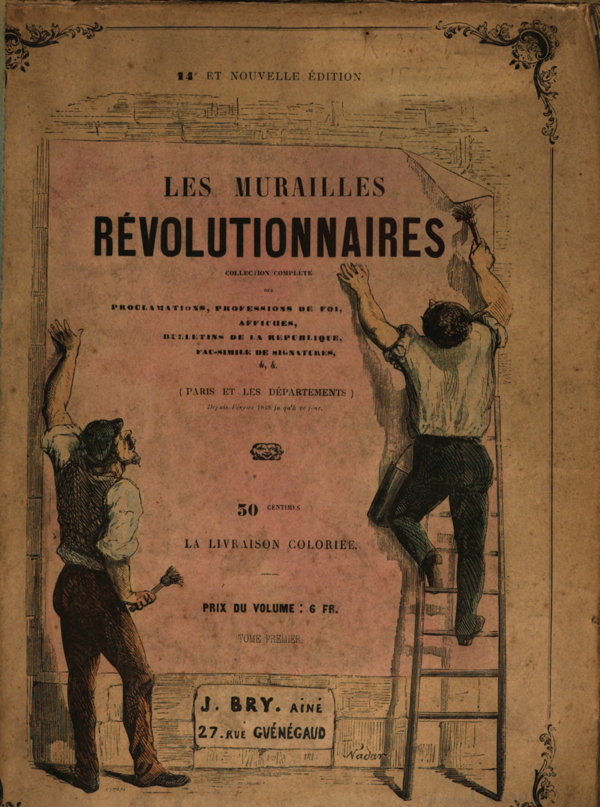
Jacques Bonhomme, (Paris: 11 June - 13 July, 1848)
[Created: 29 July, 2014]
[Updated: 26 October, 2021] |
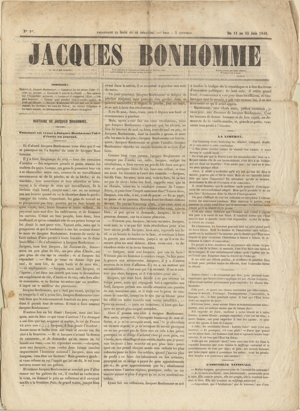 |
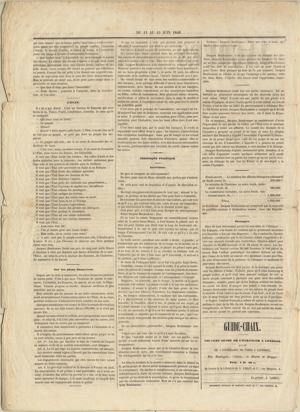 |
New Edition!
A new edition of this journal has been published by the Institut Coppet, Paris in October 2014. Purchase and (download here.
Source
Jacques Bonhomme, (Paris: 11 June - 13 July, 1848).
- Issue 1: 11-15 June - Page 1 [Facs. PDF 16.6 MB], Page 2 [Facs. PDF 16.1 MB] - [Transcription and Translation]
- Issue 2: 15-18 June - Page 1 [Facs. PDF 16.3 MB], Page 2 [Facs. PDF 15.8 MB] - [Transcription and Translation]
- Issue 3: 20-23 June - Page 1 [Facs. PDF 16.4 MB], Page 2 [Facs. PDF 17.2 MB] - [Transcription and Translation]
- Issue 4: 9-13 July - Page 1 [Facs. PDF 3 MB]; Page 2 [Facs. PDF 3.5 MB] - [Transcription and Translation]
Authors (unsigned): Frédéric Bastiat, Gustave de Molinari, Charles Coquelin, Alcide Fonteyraud, and Joseph Garnier.
The page images are presented here in 900px wide JPGs. I will provide links to high resolutions JPGs and PDFs in the near future. My other plan is to transcribe the French text and then translate it into English.
Hatin says that some of the articles were also published in large format on pink paper which were plastered on the walls around Paris during the revolution. Here is an example of what it might have looked like:
|
About the Journal
Jacques Bonhomme was a short lived journal which was written and distributed on the streets of Paris during the 1848 Revolution by 5 economists, Frédéric Bastiat, Gustave de Molinari, Charles Coquelin, Alcide Fonteyraud, and Joseph Garnier. It appeared approximately weekly with 4 issues between 11 June to 13 July. It was forced to close by the violent repression by the army of the 'June Days' uprising.
None of the articles are signed but Prosper Paillottet, the editor of Bastiat's Oeuvres complètes (1854-55), tells us that Molinari had kept complete copies of the series and could identify the authorship of the articles. Here is his list of Bastiat's contributions. One of the most important ones is Bastiat first draft of what would later become his essay "The State":
- “La liberté” (Freedom) [1er numéro du Jacques Bonhomme, du 11 au 15 juin 1848.] [OC, vol. 7, 56.] [CW, vol. 1, pp. 433-34]
- “Laissez faire” (Laissez-faire) [1er numéro du Jacques Bonhomme, du 11 au 15 juin 1848.] [OC, vol. 7, 57.] [CW, vol. 1, pp. 434-35]
- “L’Assemblée Nationale” (The National Assembly) [1er numéro du Jacques Bonhomme, du 11 au 15 juin 1848.] [OC, vol. 7, 58.] [CW, vol. 1, p. 451]
- “L’État” (The State) [1er numéro du Jacques Bonhomme, du 11 au 15 juin 1848.] [OC, vol. 7, 59.] [CW, vol. 2, pp. 105-6]
- “Prendre cinq et rendre quatre ce n’est pas donner” (Taking Five and Returning Four is not Giving) [N° 2 de Jacques Bonhomme, du 15 au 18 juin 1848.] [OC, vol. 7, 60.] [CW, vol. 4, forthcoming]
- “Une mystification” (A Hoax) [N° 2 de Jacques Bonhomme, du 15 au 18 juin
1848.] [OC, vol. 7, 61.] [CW, vol. 4, forthcoming]“Funeste gradation” (A Dreadful Escalation) [N° 3 du Jacques Bonhomme, du
20 au 23 juin 1848.] [OC, vol. 7, 62.] [CW, vol. 4, forthcoming]
- “Aux citoyens Lamartine et Ledru-Rollin” (To Citizens Lamartine and Ledru-Rollin) [N° 3 du Jacques Bonhomme, du 20 au 23 juin 1848.] [OC, vol. 7, 63.] [CW, vol. 1, pp. 444-45]
Summary of Contents
Issue 1: 11-15 June:
- "Histoire de Jacques Bonhomme" (The History of Jacques Bonhomme) [author unknown]
- "La Liberté (with "Laissez-faire) (Liberty and Laissez-faire) [attributed to Bastiat by Paillotttet and Molinari]
- “L’Assemblée Nationale" (The National Asssembly) [attributed to Bastiat by Paillotttet and Molinari]
- “L’État” (The State) [attributed to Bastiat by Paillotttet and Molinari]
- "Sur les plans financiers" (On the Financial Plans) [author unknown]
- "Chronique politique (Intérieur, Étranger)" (Political Chronicle: Domestic and Foreign) [author unknown]
- Advertisement
Issue 2: 15-18 June:
- "Quelques idées sur les socialistes, ou À qui le tour?" (A few ideas about the socialists, or whose turn is it?) [author unknown]
- "Jacques Bonhomme attend la Constitution avec l'impatience" (Jacques Bonhomme is waiting impatiently for the(new) Constitution) [author unknown]
- "Comme quoi prendre cinq et rendre quatre, ce n'est pas donner" (To take five and to return four is not giving) [attributed to Bastiat by Paillotttet and Molinari]
- "Consultations gratuites de Jacques Bonhomme" (Free advice from Jacques Bonhomme) [author unknown]
- "Le Service de la poste" (The Postal Service) [author unknown]
- "Une mystification" (A Hoax) [attributed to Bastiat by Paillotttet and Molinari]
- "Chronique politique. - M. Louis Bonaparte. - Les trente-six manières de faire banqueroute. - Vive la République de Jacques Bonhomme. - L'Assemblée nationales." (Political Chronicle. Mr. Louis Bonaparte. 36 ways to go bankrupt. Long live the Republic of Jacques Bonhomme! The National Assembly) [author unknown]
- Announcements/Advertisements
Issue 3: 20-23 June:
- "Aux citoyens Lamartine et Ledru-Rollin" (To Citizens Lamartine and Ledru-Rollin) [attributed to Bastiat by Paillottet and Molinari]
- "Funeste gradation" (A Dreadful Escalation) [attributed to Bastiat by Paillottet and Molinari]
- "Les Conseils des Départements et des Communes" (The Councils of the Départements and the Communes) - "Tous les Français fonctionnaires publics" (All French Public Servants) [author unknown]
- "Plan du ministre finances" (The Plan of the Minister of Finance) - Cautionnements (Security Bonds) [author unknown]
- "Consultations gratuites de Jacques Bonhomme (suite.)" (Free Advice from Jacques Bonhomme (continued)) [author unknown]
- "Chronique politique: Jacques Bonhomme à l'Assemblée nationale" (Political Chronicle: Jacques Bonhomme at the National Assembly) [author unknown]
- "Avis publics" (Public Notices)
Issue 4: 9-13 July:
- Guerre civile et misère.
- Sur ce que l’on peut faire pour améliorer la condition du peuple.
- Timbre et Cautionnement.
- Ré-organisation du Conseil municipal.
- Si Jacques Bonhomme avait de l’argent !
- Entente cordiale entre la France et l’Angleterre.
- Jacques Bonhomme à l’Assemblée nationale.
- Dissolution des Ateliers nationaux.
- Nouveau plan des Finances.
- Nouveau Gouvernement.
- Décrets relatifs aux bons du Trésor et à la Caisse d’épargne, etc.
About "Jacques Bonhomme"
Jacques Bonhomme [the journal]
Bastiat and Molianri launched two short-lived journals directed at working people during the 1848 Revolution. The first was called La République française which appeared in February and March and the second called Jacques Bonhomme which appeared in June. The title “Jacques Bonhomme” (literally Jack Goodfellow) is the name used by the French to refer to “everyman,” sometimes with the connotation that he is the archetype of the wise French peasant. Bastiat uses the character of Jacques Bonhomme frequently in his constructed dialogues in the Economic Sophisms as a foil to criticise protectionists and advocates of government regulation. Bastiat joined Gustave Molinari, Charles Coquelin, Alcide Fonteyraud, and Joseph Garnier in editing the journal the first issue of which appeared just before the June Days uprising (23-26 June) took place. It was a short-lived biweekly paper 4 issues of which appeared between 11 June to 13 July; with a break between 24 June and 9 July. The first issue was a single page only on "papier rose" designed to be posted on the walls of buildings. On June 21 the government decided to close the so-called National Workshops, which were a government program to provide state subsidised employment to unemployed workers, because of out of control expences. This was promptly followed by a mass uprising in Paris to protest the decision and troops were called in to suppress the protesters causing considerable loss of life. While this was happening Bastiat sent Molinari and the editorial committee an article he had written entitled "Dissolve the National Workshops!” which appeared on the front page of the very last issue of Jacques Bonhomme. They closed their journal because of the violence which broke out in the streets as the army suppressed the rioters. It was in Jacques Bonhomme that Bastiat published the first draft of what was to become his essay “The State.”
Jacques Bonhomme [person]
“Jacques Bonhomme” (literally Jack Goodfellow) is the name used by the French to refer to “everyman,” sometimes with the connotation that he is the archetype of the wise French peasant. Bastiat uses the character of Jacques Bonhomme frequently in his constructed dialogues in the Economic Sophisms as a foil to criticise protectionists and advocates of government regulation. In England at this time the phrase used to refer to the average Englishman was “John Bull”; in the late 19th and early 20th century English judges used to refer to “the man on the Clapham Omnibus” to refer to the average British citizen with common sense; a more colloquial contemporary American expression for the average man would be “Joe Six Pack”. In the FEE translation it has been translated as “John Goodfellow” which is a close literal translation of the French. It should be noted that the name “Jacques Bonhomme” was given to the small magazine that Bastiat and Molinari published and handed out on the street corners of Paris in June and July 1848. They were forced to close it down following the bloody riots in Paris known as the “June Days”.
The opposite of the clever Jacques Bonhomme (Jack Goodfellow) figure was the stupid and slow learning Gros-Jean (Big or Fat John). Gros-John is quite stupid and does not learn from his mistakes. He was popularized by La Fontaine in his fable about "The Milk Maid and the Pail". After daydreaming about how she will spend the money she has not yet earned at the markets, Perrette spills her pail of milk and ends up with nothing. She concludes the story by saying "I am Gros-Jean just like before."
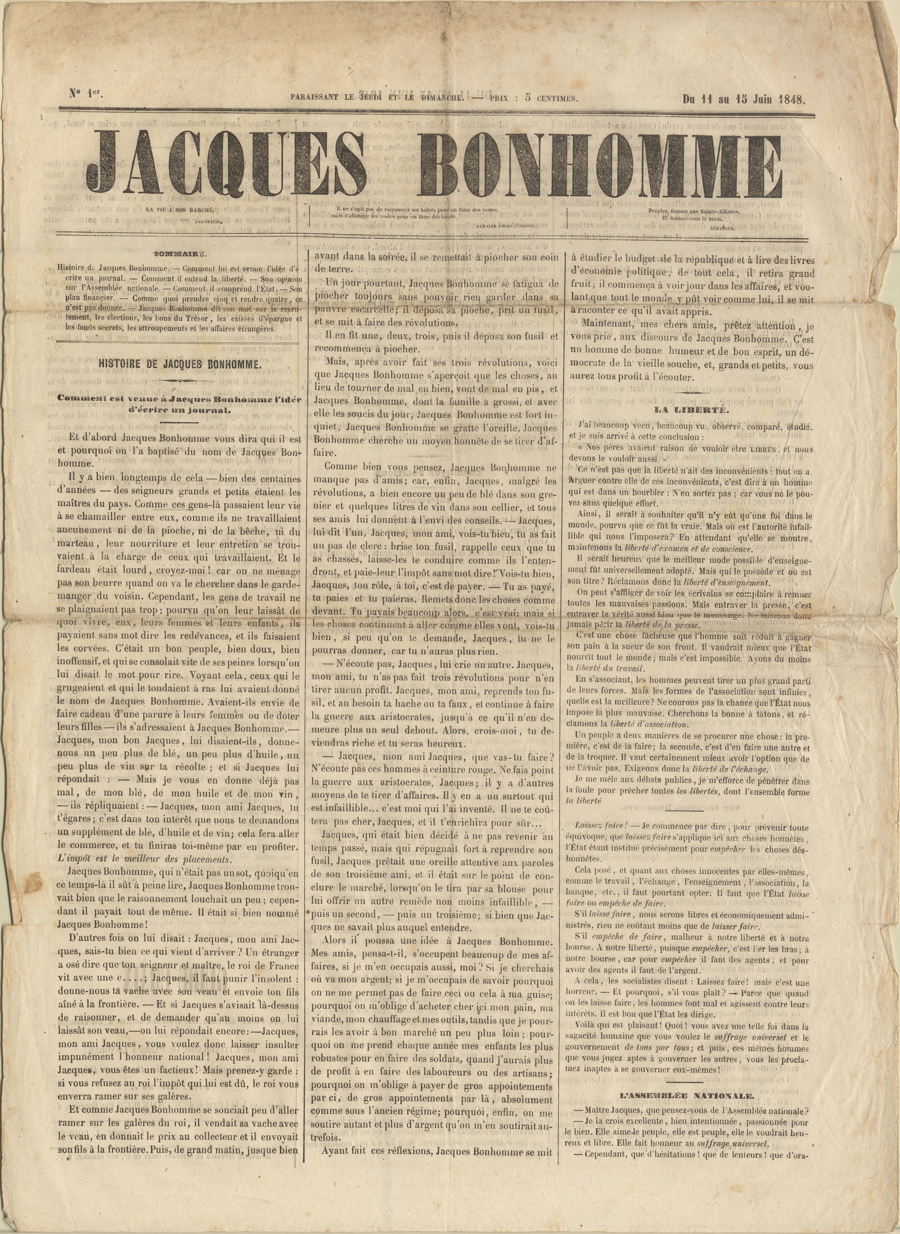 |
Page 1 of Issue 1 (11-15 Jun, 1848) [PDF
18MB] |
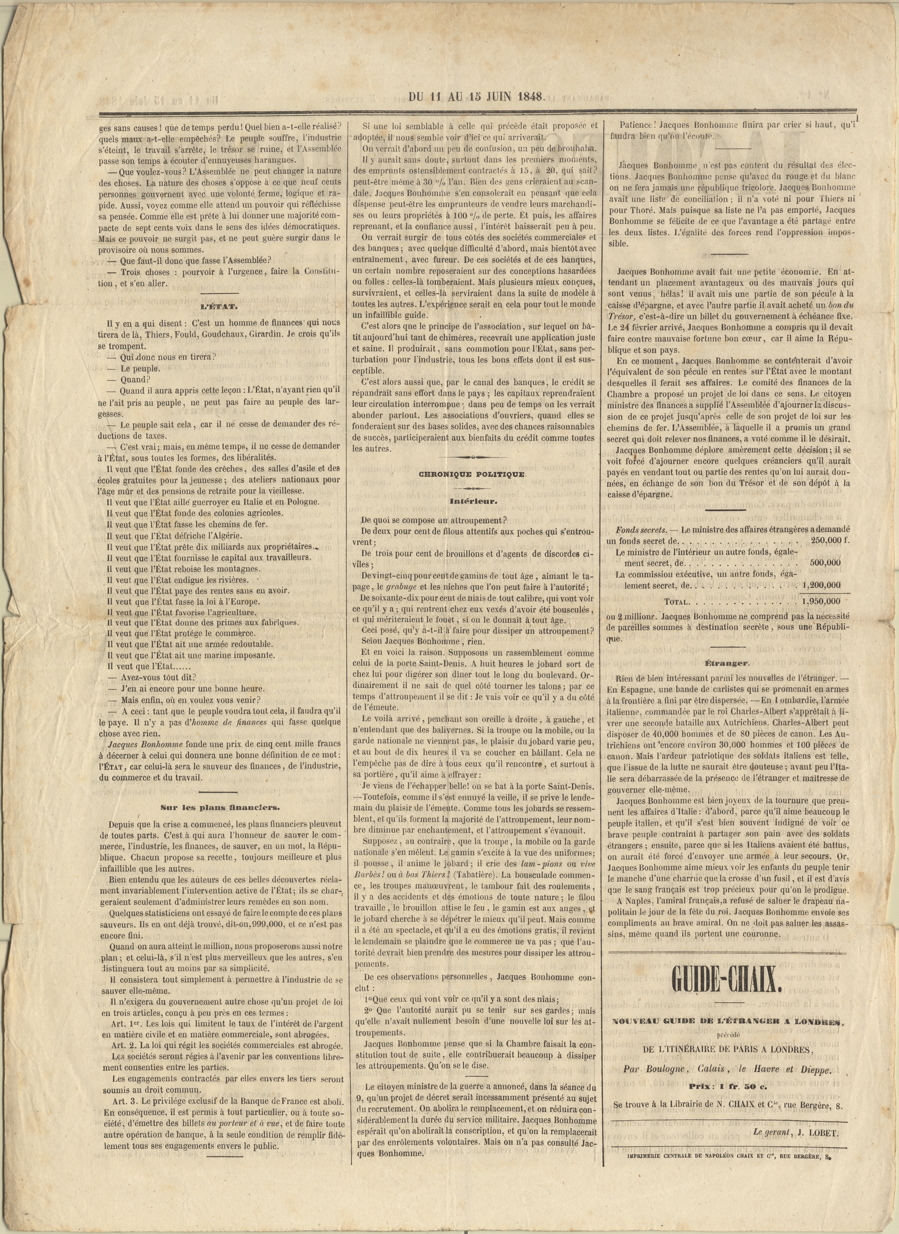 |
Page 2 of Issue 1 (11-15 June, 1848) [PDF
16 MB] |
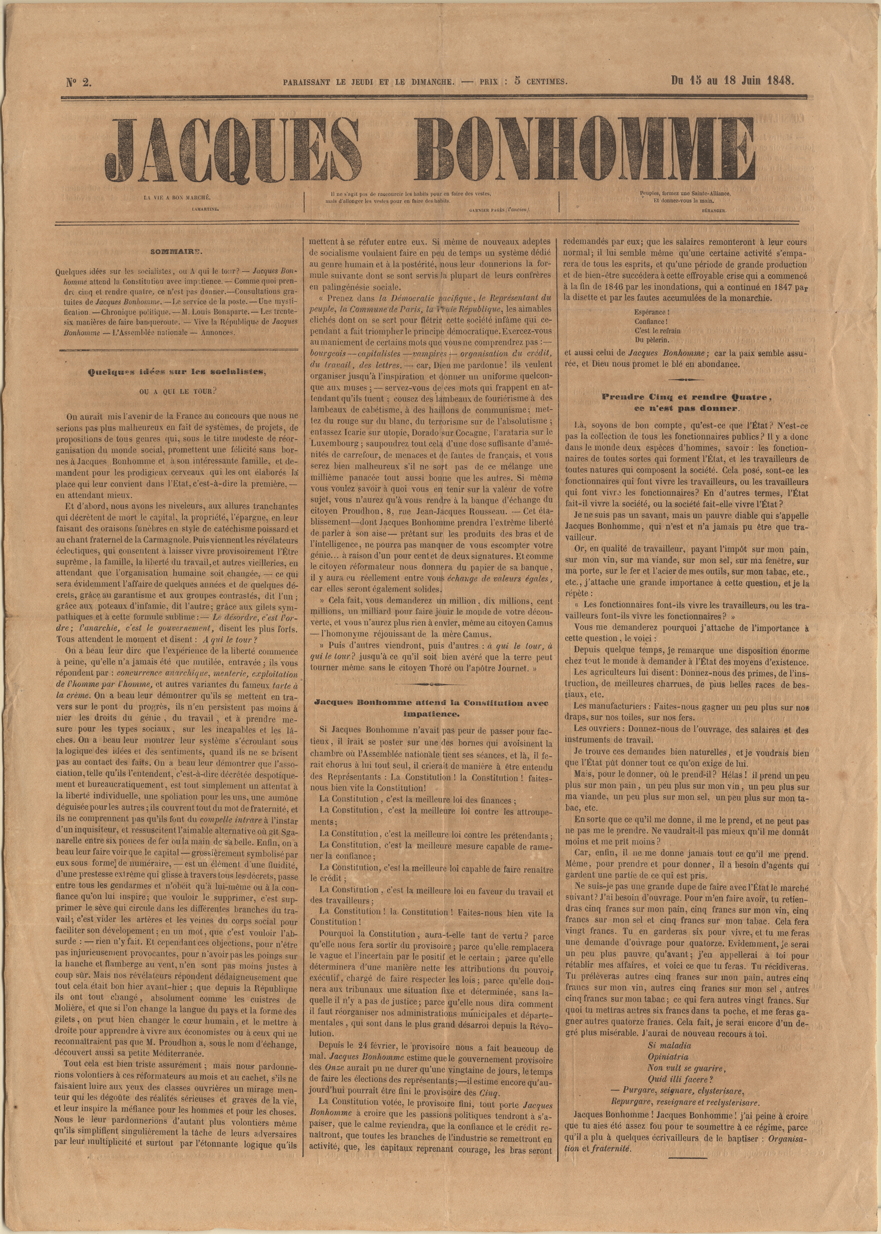 |
Page 1 of Issue 2 (15-18 June, 1848) [PDF
16 MB] |
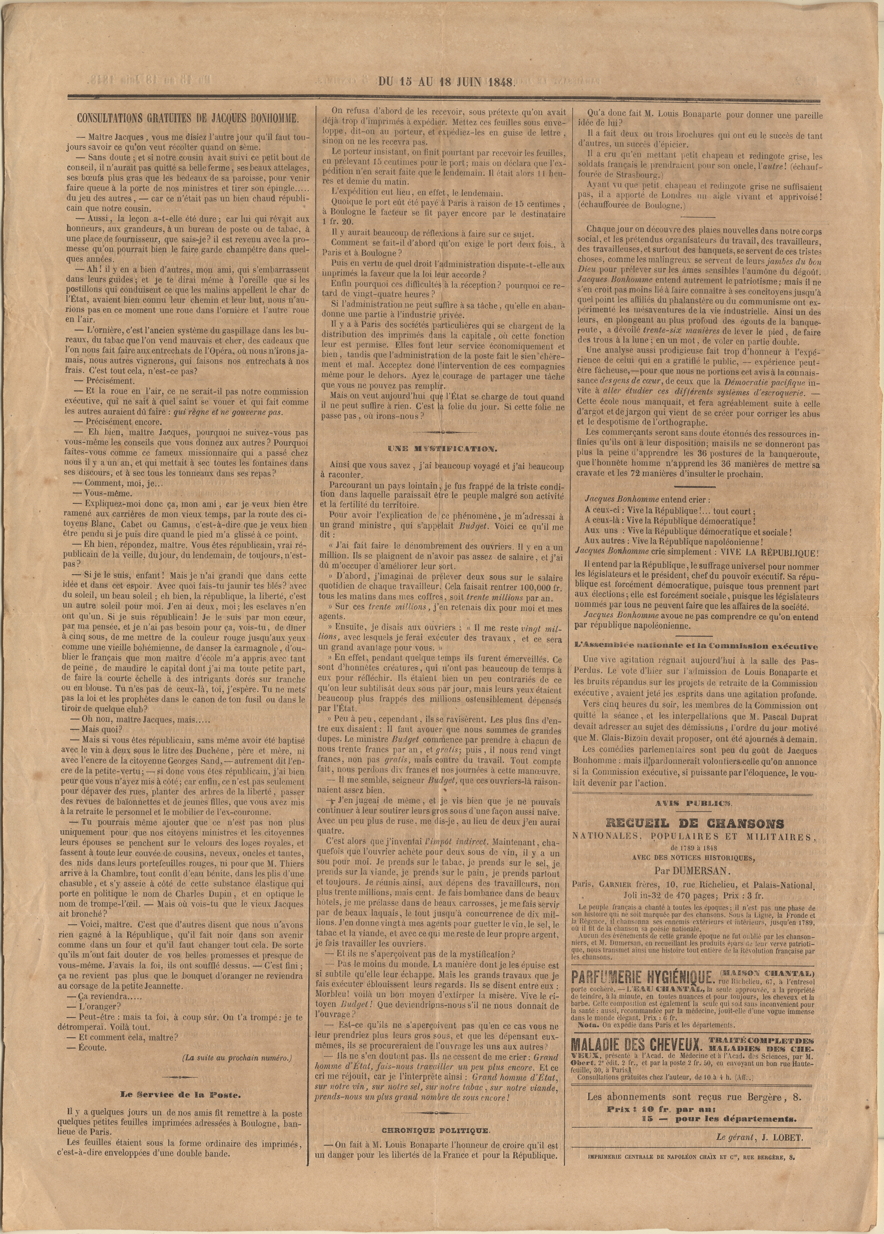 |
Page 2 of Issue 2 (15-18 June, 1848) [PDF
16 MB] |
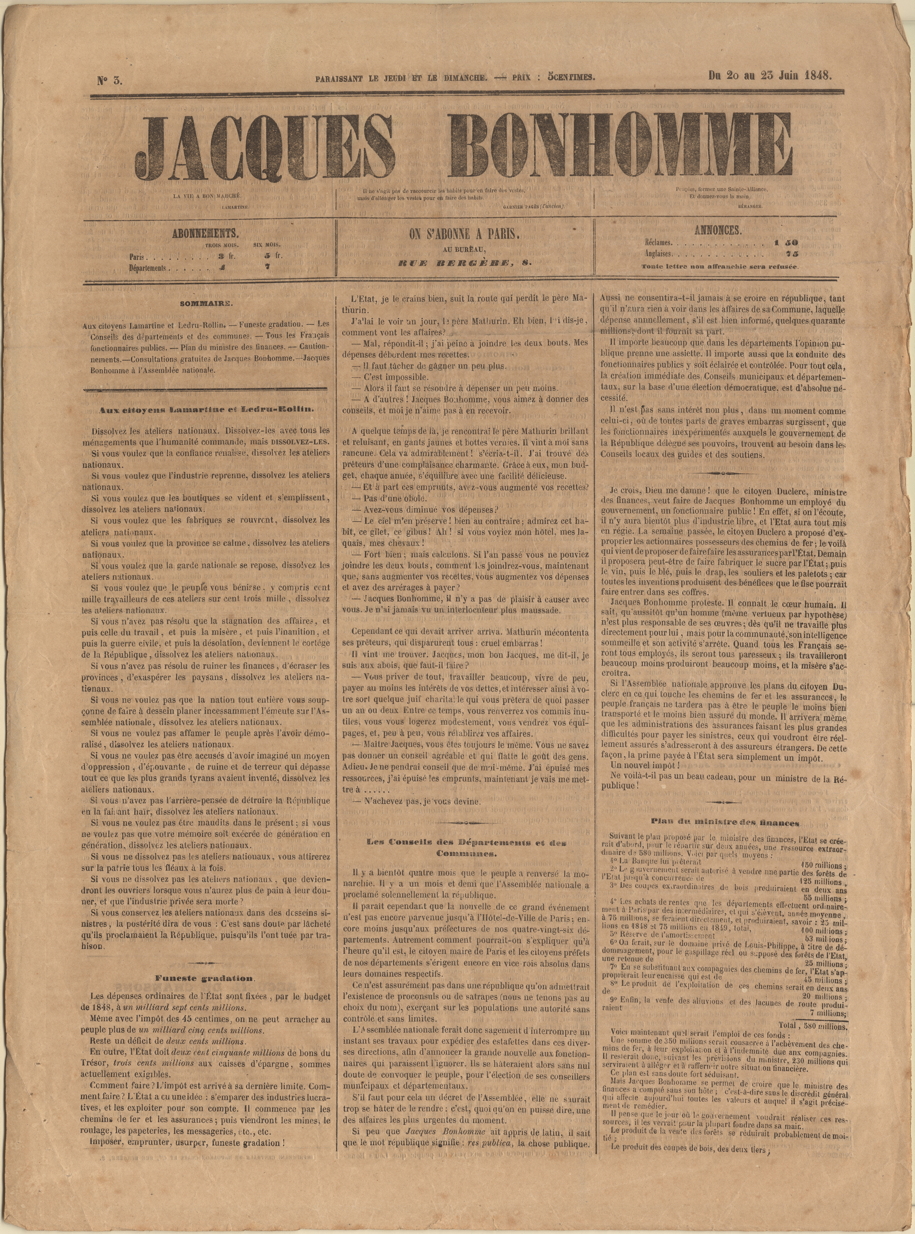 |
Page 1 of Issue 3 (20-23 June, 1848) [PDF
16 MB] |
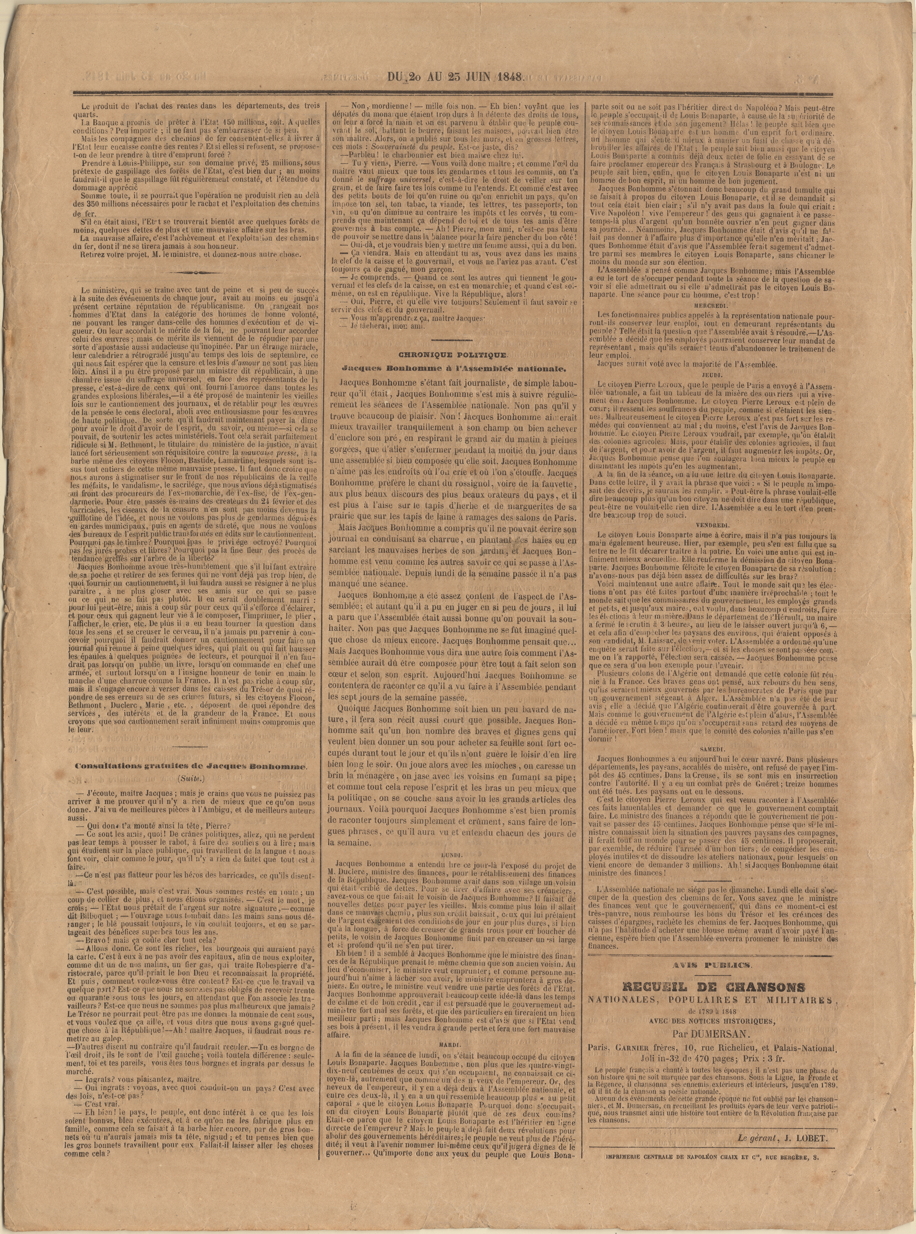 |
Page 2 of Issue 3 (20-23 June, 1848) [PDF
17 MB] |
 |
Page 1 of Issue 4 (9-13 July, 1848) [PDF
3 MB] |
 |
Page 2 of Issue 4 (9-13 July, 1848) [PDF
3.5 MB] |
